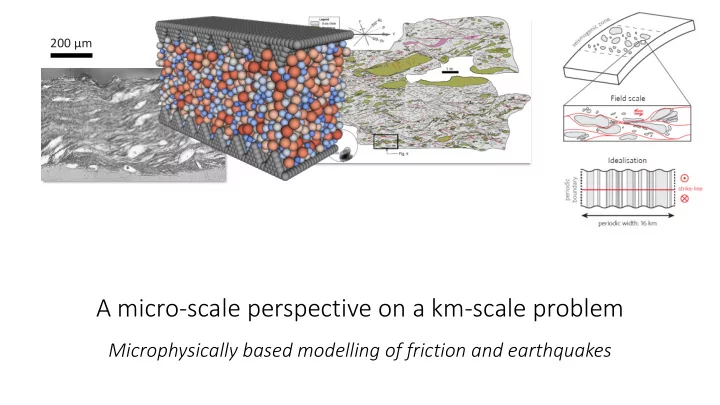

200 µm A micro-scale perspective on a km-scale problem Microphysically based modelling of friction and earthquakes
Brace & Byerlee (1966) Dieterich (1972) Dieterich (1978)
Rate & State Friction Scholz (2002) # ∗ + - ln # ∗ % # !(#, %) = ! ∗ + * ln . / 0% 01 = 2(%, #, … )
+ ! "" = ! ∗ + & − ( ln + ∗ & − ( = −0.005
+ ! "" = ! ∗ + & − ( ln + ∗
+ ! "" = ! ∗ + & − ( ln + ∗ & − ( < 0 & − ( > 0 0 > ( − & − ( < 0 &
Quick summary • Modelling and analysis relies on rate-and-state friction • RSF is empirical formulation => problem for extrapolation • We need models based on physical principles
Coming up… 1. Lab observations of fault friction, micro-scale processes 2. Basic concepts behind microphysical models 3. Applications in seismic cycle modelling
Part 1: Lab observations
Velocity-step tests Velocity Shear stress
Velocity-step tests ! # Velocity ! " ∆$ = % − ( ln ! # ! " % ln ! # ! Shear stress ( ln ! " # ! " $ " $ #
Velocity-step tests Chester (1994)
Microstructures Shimamoto (1986)
Microstructures Bos et al. (2000)
Niemeijer & Spiers (2007) Microstructures
Microstructures Dynamic weakening
Micro-scale processes Barker & Kopp (1991) Pressure solution
Micro-scale processes Bos et al. (2000) Pressure solution
Micro-scale processes Granular flow
Recap Part 1 • Velocity dependence of friction is not a constant • Several deformation regimes • Microstructural changes between deformation regimes • At least 2 micro-scale processes
Part 2: Microphysical models
Basic ingredients 1. Pressure solution => Time-dependent compaction 2. Granular flow => Slip-dependent dilatation 3. Microstructure => Porosity 4. Boundary conditions => Constant ! " , # $%
Model geometry (CNS model) Niemeijer & Spiers (2007) Chen & Spiers (2016)
̇ ̇ ̇ ̇ ̇ ̇ Model equations Pressure solution: , (- = 4"5(1) 3 (- = 4A5(1) Main ODE Granular flow: !" ∗ exp " 1 − < ∗ tan @ − A < ∗ + tan @ !# = % & '( − ℎ , (- + ̇ , /0 , /0 = ̇ , /0 C A + " tan @ B 3 /0 = − tan @ ̇ , /0 !1 !# = − 1 − 1 3 (- + ̇ 3 /0
Steady-state behaviour Ductile creep (zero porosity) Increasing porosity
Transient behaviour
Recap Part 2 • Quantified micro-scale processes • Incorporated constitutive relations into spring-block model • Steady-state and transient frictional behaviour = OK • Microphysical model explains lab results
Part 3: Seismic cycle modelling
Skipping 6 orders github.com/ydluo/qdyn
Earthquakes!
See: Van den Ende, Chen, Ampuero, Earthquakes! Niemeijer (2018, Tectonophysics)
Into the field Faulkner et al. (2003) Fagereng (2011a,b) Kimura et al. (2012) and others…
Back to safety… Matrix : “fast” pressure solution Asperities : “slow” pressure solution
Earthquakes!
Earthquakes! “Regular” earthquakes ( M w < 6) “Anomalous” earthquakes Slow slip events
Why anomalous earthquakes? Stable creep Unstable slip
Why anomalous earthquakes?
Why anomalous earthquakes?
Recap Part 3 • Interplay between pressure solution and granular flow gives earthquakes • Variations in pressure solution kinetics leads to complex slip behaviour • Massive instability facilitated by flow-to-friction transition
Perspectives Microphysically-based (numerical) modelling offers new avenues for 1. studying earthquake and slow slip mechanics Incorporating micro-scale processes and physical principles facilitates 2. collaboration between experimental- and field geologists, and modellers Far future: earthquake hazard assessment and forecasting based on 3. physical/chemical considerations
Recommend
More recommend